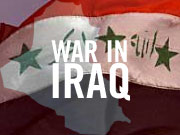Audio
Photos
Resources
Your Voice
| ||||||||||||||||||||||||
Bush says democratic transition in Iraq won't be rushed
September 23, 2003
 |
| President Bush speaks at the United Nations Tuesday. (Photo courtesy of White House) |
United Nations — (AP) - President Bush challenged the United Nations on Tuesday to support his plan for a measured and deliberate transition to democratic rule in Iraq. French President Jacques Chirac, who has insisted on a quick handover, called for a "realistic" timetable.
"This process must unfold according to the needs of Iraqis," Bush told world leaders at the opening of the U.N. General Assembly, the first such gathering since the United States invaded Iraq and toppled Saddam Hussein.
Chirac, speaking shortly after Bush, said the process need to be conducted "according to a "realistic timetable," and that the United Nations could "help the Iraqis draft a constitution and hold elections."
 | |||
"In Iraq, the transfer of soverignty to the Iraqis, who must have sole responsibility for their future, is essential for stability and reconstruction," Chirac said.
The French president has said he wants a handover of power to the Iraqis in a matter of months - and on Tuesday the German chancellor backed that timetable. But Chirac has said his country will not veto a planned U.S. resolution on Iraq aimed at attracting international troops and funds.
Bush faced a skeptical audience as he addressed a body that split severely over the U.S. war on Iraq and continues to show differences over how to deal with the post-war transition.
U.N. Secretary-General Kofi Annan opened the debate with a criticism of Bush's "pre-emptive" attack on Iraq.
Such strikes "could set precedents that result in a proliferation of the unilateral and lawless use of force, with or without credible justification," he told the gathering. He underlined that the world should collectively address the threats that prompt pre-emptive action - terrorism and weapons of mass destruction.
But Annan also urged world leaders to set aside their disputes over the war and join forces to build a peaceful democracy in Iraq.
Bush, speaking with Chirac in the audience, invited the United Nations to play an expanded role in Iraq's reconstruction. The world body should assist in preparing a constitution for Iraq, help train civil servants and conduct free and fair elections, Bush said.
"Every young democracy needs the help of friends," he declared. The president's address was received politely by the General Assembly audience. Bush left the United Nations' headquarters before Chirac spoke.
|
The United Nations system is prepared to play its full part in working for a satisfactory outcome in Iraq, and to do so as part of an effort by the whole international community.
- U.N. Secretary General Kofi Annan |
Also in the audience was Ahmad Chalabi, the current president of the U.S.-appointed Iraqi Governing Council, who took Iraq's seat in the General Assembly. After his speech - and before Chirac's - Bush left the U.N. headquarters.
In his address, Chirac insisted the right to use force can only come from the U.N. Security Council.
"No one should be able to accord himself the right to use (force) unilaterally and preventatively," an advance copy of Chirac's speech said.
"In an open world, no one can isolate themselves, no one can act alone in the name of all and no one can accept the anarchy of a society without rules," he said. "There is no alternative but the United Nations."
Earlier, as leaders streamed into U.N. headquarters, Annan held a series of meetings, including one with German Chancellor Gerhard Schroeder, who told reporters that he wanted to see power handed over to the Iraqi people in a "matter of months."
It was Schroeder's most specific comments yet on a timetable and echoed the French position for a swift hand-over of power to the Iraqis. Previously Schroeder had said Berlin would like to see the transfer take place "as quickly as possible."
Last year, Bush came to the General Assembly to challenge its member states to confront the "grave and gathering danger" of Saddam Hussein's Iraq - or stand aside as the United States acted alone.
In the months that followed, France, Germany, Russia and others opposed the war and were incensed when the United States attacked Iraq without Security Council approval.
This year, with mounting bills and U.S. casualties, Bush wants help from the United Nations and support for a U.S.-backed resolution that Washington hopes will encourage countries to contribute troops and money.
France, Germany and Russia want a larger U.N. political role and a much quicker transfer of power to the Iraqis than Washington is prepared to accept.
The key U.N. meeting comes after devastating bomb attacks against its headquarters in Baghdad in the past month have plunged the world body into mourning and raised questions about its future role.
"Subject to security considerations, the United Nations system is prepared to play its full part in working for a satisfactory outcome in Iraq, and to do so as part of an effort by the whole international community," Annan said.
He called on member states to address the expansion of the Security Council - an issue that has gone nowhere for a decade - and urged the council to deal effectively with the most difficult issues. Response to massive killings and rights abuses in Congo and Liberia this year had been "hesitant and tardy," he said.
Annan sent letters to world leaders ahead of this week's meeting, challenging them to come up with new ideas to deal with wars, terrorism, poverty and other threats to international security.
(Copyright 2003 by The Associated Press. All Rights Reserved.)
|
News Headlines
|
Related Subjects
|

